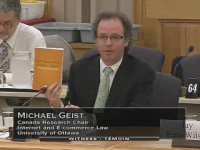Today is copyright day at the Senate, where the Senate Committee on Banking, Trade and Commerce is devoting seven hours to hearing from over 20 witnesses on Bill C-11, the copyright reform bill that passed the House of Commons earlier this week. I was asked to appear and participated in the first session of the day. My opening statement is posted below. The discussion focused primarily on the digital lock rules with a good opportunity to focus on the dangers of the current approach. My recommendation was to use the regulation power found in Bill C-11 to create a digital lock exception linking circumvention to copyright infringement.
 Articles by: Michael Geist
Articles by: Michael Geist
Big Pharma Spending Ratio on Canadian R&D Continues To Decline As IP Demands Increase
Now the same companies are lobbying relentlessly for a new round of patent reforms that they say will lead to further growth in research and development. However, a new report from government’s Patented Medicines Prices Review Board shows that RxD spending to sales ratio continues a decade-long decline, hitting its lowest level since the 1987 reforms.
Internet Domain Name Land Grab More Than Just “Fools Gold”
Internet Domain Name Land Grab More Than Just “Fools Gold”
gtld expansion Appeared in the Toronto Star on June 17, 2012 as Internet Domain Name Land Grab More Than Just “Fools Gold” Last week, the Internet Corporation for Assigned Names and Numbers (ICANN), the California-based non-profit corporation charged with the principal responsibility for maintaining the Internet’s domain name system, revealed […]
European Parliament’s INTA Committee Votes to Reject ACTA
The European Parliament’s INTA committee, the lead committee studying the Anti-Counterfeiting Trade Agreement, has voted to reject ACTA. The 19-12 vote against the agreement means that all five EP committees that studied ACTA voted against ratification. I appeared before the INTA committee’s workshop on ACTA earlier this year and submitted […]







